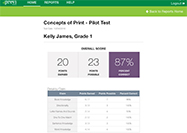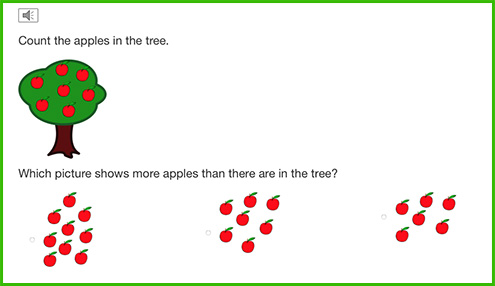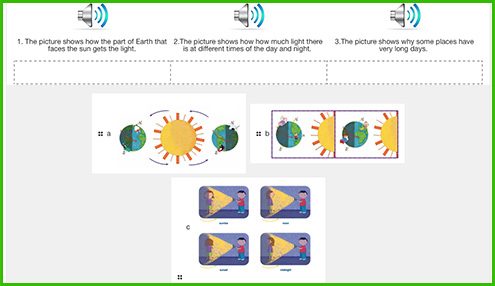 Our earliest learners need a strong foundation to set them on a path for success. From learning to count to understanding concepts of print, the tools used in the classroom must be designed with an understanding of how K-2 students learn and provide a way for teachers to meet students where they are and help them grow. As students learn the basic skills of literacy, numeracy, collaboration, and critical thinking, teachers need effective ways to check on their student’s progress and adjust instruction to support each child’s unique needs.
Our earliest learners need a strong foundation to set them on a path for success. From learning to count to understanding concepts of print, the tools used in the classroom must be designed with an understanding of how K-2 students learn and provide a way for teachers to meet students where they are and help them grow. As students learn the basic skills of literacy, numeracy, collaboration, and critical thinking, teachers need effective ways to check on their student’s progress and adjust instruction to support each child’s unique needs.
Our team understand assessment. As educators and content specialists we have designed some of the nation’s leading tests and we use our experience to design solutions that help educators build a bridge between curriculum, instruction, and assessments.
Assessment for Learning
Traditionally, assessing in grades K-2 has been a time-consuming process that was administered via paper and pencil. This process doesn’t provide real-time feedback to teachers about each child. And even when it does, manual scoring of paper-based assessments takes time, so teachers get the data too late to immediately impact instruction.
The English language arts and mathematics experts at CenterPoint Education Solutions are former educators who used their classroom experience when they set out to develop an online assessment. They knew that teachers needed an assessment that would streamline the testing process, preserve valuable instructional time, and provide real-time data teachers can use to make instructional decisions about each student’s readiness.
CenterPoint’s K-2 online interim assessments help schools and districts meet these needs and help ensure consistent administration to provide teachers with reliable data with which to make decisions about how to adapt instruction and support students. These engaging tests help ensure students are on track to succeed in successive grade levels. The assessments provide data on the skills and knowledge students need to build on their learning in foundational skills, reading comprehension, written expression, along with mathematics reasoning and fluency.
The early learning interim assessments were designed to support an educator’s understanding of students’ knowledge at the beginning of the year and their growth through the year. The real-time reports also provide important student information to school and district administrators, so they can plan targeted professional development to help improve teaching and learning.
Online assessments for grades K-2 take advantage of technology-enhanced items including drag and drop, fill-in-the-blank, along with multiple choice item types. Graphic and audio-based cues in the assessments support emerging readers without reducing the rigor of the items.

The K-2 assessments include four unique forms that can be administered in under 30 minutes based on district, school, or teacher determination during a school’s instructional calendar. The assessments measure critical English language arts and mathematics standards to help educators determine instructional needs using real-time data.

Administrators and teachers will have access to real-time reports throughout the year including individual student data and class data. Reports contain full detail by skill, category, domain, and other key information aligned to state standards and delivered in an easy-to-use format.

Traditional K-2 assessments are paper and pencil-based, taking valuable instructional time to administer and requiring teachers to read the prompts to individual students or to the whole class. The new CenterPoint K-2 interims were designed to be computer-based. Online assessment has advantages over paper and pencil tests that are especially helpful for teachers of early learners who need a way to authentically test the standards. Teachers appreciate the engaging content and the fact that the assessments were designed with audio cues and graphics so that students’ reading levels are not a barrier to assessment.

Simple mathematics concepts are introduced early in life and are the building blocks to understanding mathematics as children progress through their education. Developed by mathematics experts, the CenterPoint K-2 mathematics interims measure comprehension of early numeracy, number sense, patterns, and adding and subtracting, along with fluency. The interims help ensure students are on track to succeed in successive grade levels by assessing the foundational skills and knowledge they need to build on their learning in mathematics and meet the standards as they continue to grow.

As soon children can speak, they start to develop their understanding of language, starting with phonemic awareness and phonics. The new CenterPoint ELA K-2 interims help educators learn more about a student’s foundational skills, starting with understanding concepts of print. The concepts of print assessments incorporate rich, authentic texts, and measures a student’s knowledge across six claims (book knowledge, directionality, one-to-one match, letter names and sounds, word knowledge, and sentence knowledge). As the student progresses through the grades, the assessment builds on the foundational knowledge and assesses reading comprehension and written expression to help teachers prepare each student for literacy success.
Contact Us
Provide your educators with access to valid, reliable assessments and real-time data to improve your early education program with the CenterPoint K-2 English language arts and mathematics assessment.
Read more about how our early education interim assessments can support teaching and learning.
A comprehensive suite of computer adaptive and fixed form diagnostic subtests with aligned reporting for grades k–11.